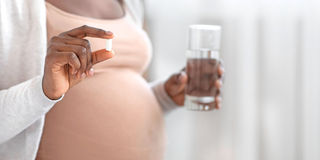Deworming cuts child deaths, saves mothers

In sub-Saharan Africa, approximately 38 million women of reproductive age, including nearly seven million pregnant women, are infected with hookworm an intestinal parasite.
What you need to know:
- The drugs are given in two intervals
- The first dose given between fourth and sixth months of pregnancy
- The second dose is given during the seventh and ninth months to mothers living where hookworm prevalence is 20 per cent high among pregnant women
Deworming during pregnancy reduces the risk of a child dying within the first four weeks after birth by 14 per cent and prevents a mother from developing anaemia, a new study has revealed.
The study showed that taking deworming drugs also lowers the chances of a mother giving birth to a child with low birthweight.
The survey by Syracuse University, the World Health Organization (WHO) and SUNY Upstate revealed that deworming reduces child mortality rate.
The study, conducted on 95 Demographic Health Survey datasets and collected on more than 800,000 births, used birth histories to measure the impact of routine deworming medicine during antenatal care on subsequent neonatal mortality and low birthweight for births between 1998 and 2018 in 56 lower income countries.
“Pregnant women who received deworming medication were associated with a 14 per cent reduction in risk for neonatal mortality, with no difference between high and low transmission countries,” said Bhavneet Walia of the Department of Public Health, Syracuse University, US in the report published in the journal PLoS Neglected Tropical Diseases.
“We also found that in countries with low transmission of soil-transmitted helminths, deworming treatment decreased the odds of low birthweight by 11 per cent varying across different countries,” she said.
Birth outcomes
The researchers matched births on the probability of receiving deworming during pregnancy. They then modelled birth outcomes with the matched group to estimate the effect of deworming during antenatal care after accounting for various risk factors.
They also tested for effect modification of soil-transmitted helminth prevalence on the impact of deworming during antenatal care for those who got deworming treatment and those who did not.
“Intestinal worms impact the health of women and girls of reproductive age and this study supports the fact that treating pregnant women can be beneficial,” said Dr Antonio Montresor, Medical Officer, WHO Department of Control of Neglected Tropical Diseases.
“WHO has long recommended the deworming of women of reproductive age after their first trimester of pregnancy and in areas where the prevalence of worm infections is 20 per cent or higher.”
According to the WHO, preventive chemotherapy (deworming) using single-dose albendazole (400mg) or mebendazole (500mg) is recommended as a public health intervention for pregnant women after the first trimester.
The drugs, according to WHO, should be in two intervals: the first dose given between fourth and sixth months of pregnancy while the second dose is given during the seventh and ninth months to mothers living where prevalence of hookworm infection is 20 per cent high among pregnant women.
It is also recommended where anaemia is a severe public health problem, with a prevalence of 40 per cent or higher among pregnant women.
Adult worms
In sub-Saharan Africa, approximately 38 million women of reproductive age (15-49 years), including nearly seven million pregnant women, are infected with hookworm an intestinal parasite.
If not treated, the infection can lead to poor pregnancy outcomes, including anaemia, which can potentially lead to preterm birth or low birth weight.
Soil-transmitted helminths get into the body when one ingests microscopic eggs passed in the faeces of infected people and dispersed in the environment.
Adult worms live in the intestines where they produce thousands of eggs each day.


